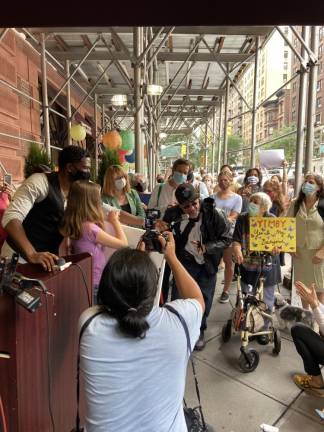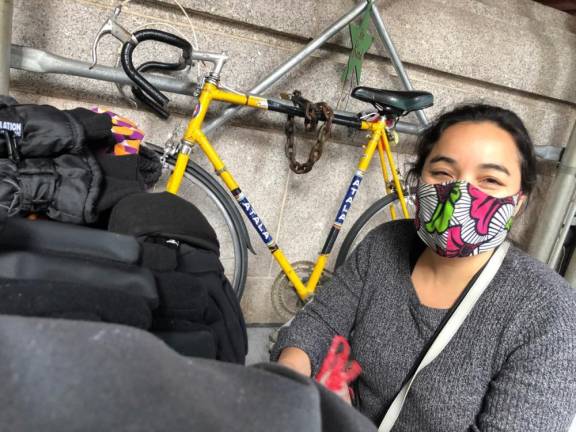Lucerne Redux
New developments in the homeless hotel saga as a judge halts residents’ move from the UWS to FiDi – and Randy Mastro’s UES home is spray-painted with graffiti


The Lucerne was once merely a hotel on the Upper West Side. But it has been transformed into a political Rorschach test of whether community opposition to its use as an emergency shelter is by definition racist.
The controversy had appeared all but over until a judge last week restrained the city from ending its use as a shelter.
So the situation spiraled on amid vandalism, accusations of racial privilege and political extremism and an only-in-New York connection to a 1986 Bronx trial that, depending on your perspective, is either notorious or legendary for raising issues of systemic racism that echo to this day.
“(H)ardly any of the white residents who agitated furiously to displace the shelter would call themselves racists, and certainly not segregationists,” two defenders of the shelter wrote in The Nation magazine. “And yet that will be the result.”
The other side says this blots out local details of crime, quality of life and proper services for those living in the shelters and reduces the entire dispute to a progressive litmus test of “antiracism,” the argument that if you do not take proactive steps against racist policies you are collaborating in the preservation of racist systems.
All of this might have been an historical debate were it not for the surprise ruling last week by Justice Debra James of New York State Supreme Court blocking the city from moving the 240 men still sheltered at the Lucerne, just as they were about to leave for a former Radisson hotel in the financial district.
James ruled after receiving affidavits from three residents of the Lucerne saying that yet another move would be destabilizing for them. The judge had already approved the use of the Radisson as a shelter, rejecting the arguments of FiDi residents.
So now the Radisson will be used to shelter others, while the men remain at the Lucerne as the case proceeds.
“And we hope that, rather than continuing to oppose our clients’ efforts, the Mayor and City consider a collaborative solution – one that recognizes that, although homeless, these men have something meaningful to offer,” said Jason Zakai, the lawyer for the three Lucerne residents.
Political Graffiti
The political twist here was that the mayor and the city had already worked collaboratively with the opponents of the shelter, represented by Randy Mastro, former Deputy Mayor to Rudolph Giuliani. It was Mastro’s threat to sue if the shelter at the Lucerne was not shut that led Mayor Bill de Blasio to announce that the men would be moved.
After James’ ruling, Mastro’s home on the Upper East Side was set upon by vandals who spray-painted the front with political graffiti and gummed up his door lock. “Randy Mastro you can’t displace us,” one of the messages read.
Police said video surveillance showed a group of about 15 people arriving on bikes at about 1 a.m. to mount the attack. The West Side Community Organization, the group that hired Mastro, denounced “political extremism and violence” and criticized local politicians who had not condemned the attack.
“This is a very sad day to see a genuine debate about serious issues involving the homeless devolve into vandalism targeting my family’s home,” Mastro said the next morning. “The persons who did this are criminals who should be brought to justice. And if they thought they were going to intimidate me, they picked the wrong guy.”
Mastro said he would not be deterred in his fight “against housing homeless adults in SRO hotels where they don’t get the services they need. This vulnerable population requires housing in proper shelters with full services.”
Mastro’s main opponents quickly separated themselves from the attack. “Open Hearts and Lucerne residents unequivocally condemn this kind of personal attack,” the UWS Open Hearts Initiative tweeted the next morning, in the first public mention of the attack. “Our fight is for human dignity for all, and we extend our support to the Mastro family.”
Open Hearts was launched as a counterweight to community opponents of the Lucerne, arguing that many Upper West Siders welcomed those needing shelter from the pandemic at the Lucerne and two other nearby hotels, the Belleclaire and the Belnord.
The group worked with men at the Lucerne to include their voices in the debate through the affidavits submitted to Justice James and via the article in the Nation.
That article was co-bylined by Corinne Low, leader of the Open Hearts Initiative, and one of the Lucerne residents, Shams DaBaron, who was described as “a screenwriter, filmmaker, and hip-hop pioneer currently experiencing homelessness.”
An Echo of 1986
That description understates DaBaron’s noteworthy place in the history of radical and racial justice politics in New York. DaBaron grew up in the Bronx with his close friend and business partner Larry Davis, who in 1986, at the age of 19, fought a gun battle with police, wounding six of them before escaping and leading police on a 17 day manhunt.
After Davis was apprehended, DaBaron assisted his lawyers, William Kunstler and Lynn Stewart, in arguing that the police had come after Davis because he had evidence of corrupt drug dealings, and that Davis was defending himself. He was convicted only of gun possession in that case. In 2008, while serving a separate sentence for killing a drug dealer, Davis, 41, was knifed to death by another inmate.
While police and mainstream politicians like Mayor Ed Koch reviled Davis, he became a folk hero to many in New York’s black community. “Larry Davis is a metaphor for genocide of black people,” Rahiem Shabazz, the journalist, podcaster and filmmaker, said to DaBaron in December, 2018, on his Necessary Blackness podcast. “He was a brave warrior who stood up at a time when many people weren’t standing up.”
Low and DaBaron make a point of describing how they are standing up together now.
“Forcing the displacement of traumatized Black men (the third—and for some, a fourth—such move since the pandemic began) to preserve white comfort is not just an abdication of the city’s responsibility to care for those in need; it is a re-victimization of these most vulnerable New Yorkers,” Low and DaBaron wrote.
They describe a moment when de Blasio ruled that the Lucerne should shut but before James intervened.
“Processing the news that Lucerne residents would be transferred, after we had built such strong friendships in our shared fight against the move, Shams sent Corinne a text saying, ‘Moving around is normal, but being cut off from a lifeline of love is like a death sentence. The Mayor has sentenced us to a spiritual and moral, if not physical, death’.”
“This is a very sad day to see a genuine debate about serious issues involving the homeless devolve into vandalism targeting my family’s home.” Attorney Randy Mastro